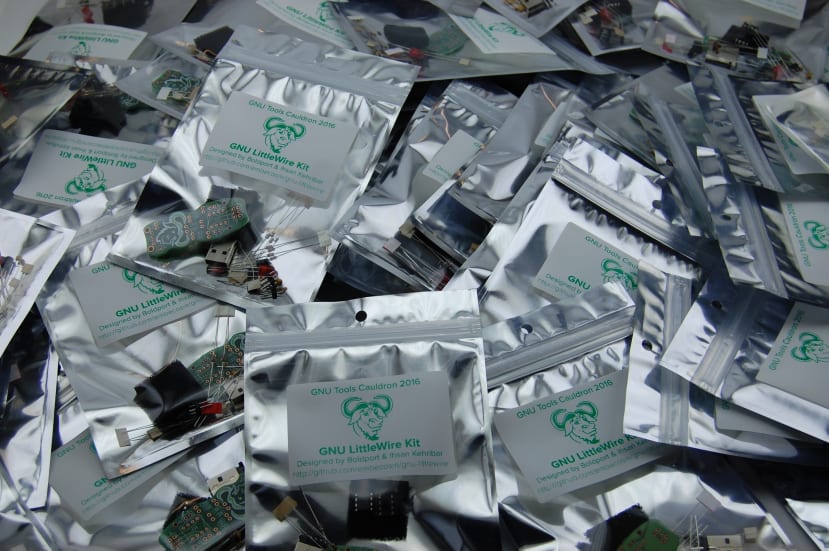Diary of a Trainee Electronics Engineer: September 2016
Follow articleHow do you feel about this article? Help us to provide better content for you.
Thank you! Your feedback has been received.
There was a problem submitting your feedback, please try again later.
What do you think of this article?
Getting to grips with GNU and heading back to my EEE HND.
The beginning of the month was packed out, what with the Wuthering Bytes Technology Festivaland starting the final year of my HND in the middle of the month, meaning that everything is starting to pick up again and I’m finally getting back into my usual routine.
GNU Tools
I’d been asked to help out as crew at the GNU Tools Cauldron this year as part of the Wuthering Bytes Festival, which involved assisting with registration and ensuring the weekend ran smoothly. I also ran a second soldering workshop on the Sunday for anyone from the Cauldron who wanted to assemble their GNU LittleWire kit.
The GNU Tools Cauldron provides an opportunity for developers of the GNU tool chain – an international community spread across the globe – to discuss progress, current and future projects, exchanging ideas and coordinating efforts.
Prior to being asked to help out I didn’t really know what the GNU Tools Cauldron was, so I did a bit of research to find out more. Id been advised to look up GNU/Linux and what that was, so to begin with I did that - I thought I knew what Linux was and as far as I was concerned it was what I had on my laptop, and as for GNU I just thought that it was an animal similar to a buffalo.
So what is GNU/Linux?
GNU/Linux is wrongly referred to most of the time and there is a lack of understanding of the relationship between GNU, Linux and GNU/Linux. Linux is the kernel and together with the GNU system these form GNU/Linux operating system. However, most people think Linux is the complete operating system.
When reading about GNU/Linux one thing which comes up quite a lot is the GNU toolchain – this is a collection of programming tools produced by the GNU project, that can be used for developing software applications and operating systems.
The GNU toolchain consists of:
- GNU make: automation tool for compilation and build.
- GNU Compiler Collection (GCC): a suite of compilers for several programming languages.
- GNU Binutils: is a suite of tools including linker, assembler and other tools.
- GNU Bison: parser generator (often used with the Flex lexical analyser).
- GNU m4: m4 macro processor.
- GNU Debugger (GDB): code debugging tool.
- GNU build system (autotools): Autoconf, Automake and Libtool.
It is worth noting that these are incredibly important tools used across the globe by huge numbers of people, for everything from smart phones to supercomputers.
Free or Open?
One thing that I did learn more about was the relationship between Free and Open Source software. I’d heard that these two were similar in concept but quite different at the same time. I thought it might be best at this point to ask a colleague for help explaining the differences, since a lot of what I read online seemed to be very biased.
The main differences between the two seem to be related to the licences attached to them. From what I understand of it, free in this context means that whoever uses the software and makes any changes to it, has to make everything including the modified source code available to whoever they pass it on to, so it remains free (as in freedom) and all the source code is available. Whereas with Open Source you can have licences where software that started out as open can be made closed and built into software where the source code is not available. A full definition of Open Source can be found here.
Student Competition
A couple of months back I entered the BSC OSSG (British Computing Society Open Source Specialist Group) Student Competition with my Light Theremin Project and found out that I’m one of the winners. So next month I’ll be making a trip down to London to receive my prize and give a fifteen minute presentation on my entry. I’m both excited and nervous at the same time, I don’t have much experience with public speaking at all and haven’t given a presentation since I gave a lightening talk at Wuthering Bytes 2014!
Back to School
I went back to college in the middle of the month and its been something which I’ve been really looking forward to for a while. Since its still early on in the term were still very much getting into the swing of things, there are more great units running this year for HND2:
- PLCs
- Electronical, Electronic & Digital principles
- Further Electrical power
- Digital & Analogue
- Project
- Electronics Principles
- E&E Principles
- Further Analytical MethodsJEREM
I’m particularly looking forward to getting my teeth stuck into Further Analytical Methods. Last year when I studied Analytical Methods it became one of my favourite units, so I cant wait to further study this module.
It is looking like October is going to be another busy month, as my HND picks up I’m hoping there are more units which will overlap with projects which I decide to build in the upcoming year.




